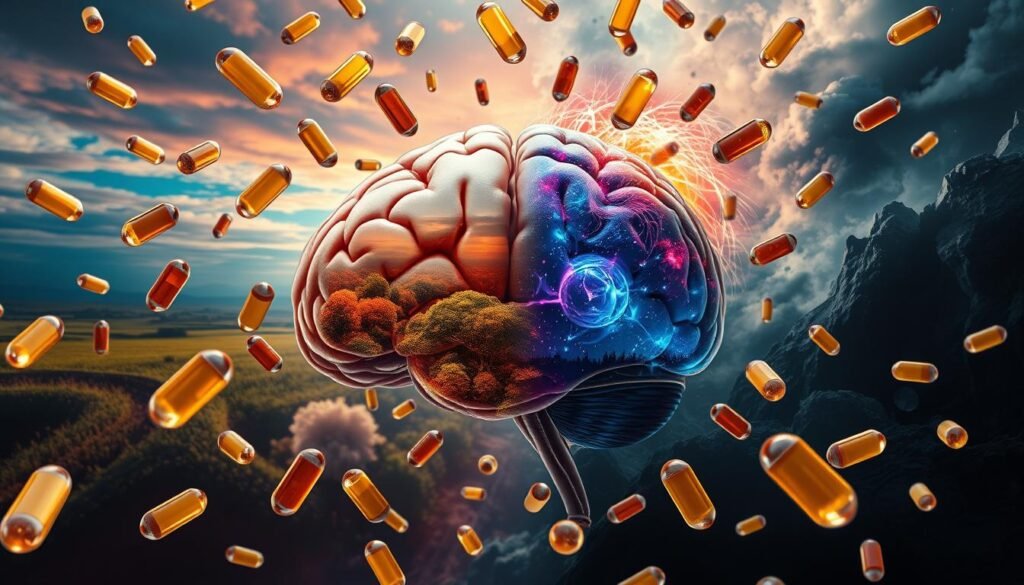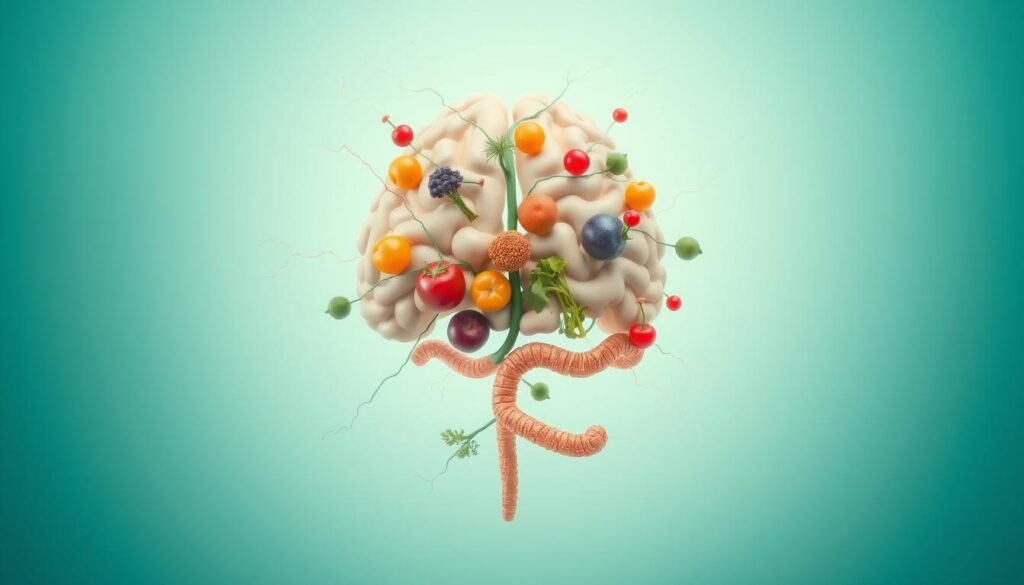It may surprise you, but over 19 million adults in the U.S. have faced depression. This shows we must look into what affects mental health. One factor not often talked about is how vitamin deficiencies might play a role. Do these deficiencies cause anxiety? Studies are now linking the two, highlighting the need for nutrients in keeping our minds healthy.
This knowledge helps us manage symptoms better and improve our wellness.
The link between vitamins and anxiety is becoming more apparent as we learn more. Not getting enough of certain vitamins like B and D can make anxiety worse and affect thinking. It’s important to see how what we eat influences our mental state.
This information encourages us to be mindful of our diet for our mental and emotional health.
Key Takeaways
- Vitamin deficiencies are increasingly recognized as potential contributors to anxiety and depression.
- Essential nutrients like B vitamins play a significant role in mood regulation and cognitive function.
- Vitamin D deficiency has been associated with mood disorders, underlining the importance of proper nutrient intake.
- Maintaining a balanced diet rich in nutrition and anxiety management can enhance mental health outcomes.
- Healthcare professionals advocate for dietary interventions alongside traditional mental illness treatments.
The Importance of Nutrients for Mental Health
Nutrients are key for our mental health. Different vitamins greatly affect how we feel. Studies show not getting enough vitamins can make us anxious or moody. This part looks at nutritional importance and its effect on our minds.
Understanding Vitamins and Their Role
Vitamins help our bodies in many ways. For instance, B vitamins are important for our mood and brain. Vitamin D affects our sleep and feelings, and vitamin E helps brain growth and our immune system. Getting enough vitamins makes us emotionally stronger and smarter, adding to nutrients mental health.
The Connection Between Diet and Mental Well-Being
What we eat really impacts our diet and mental health. Studies show lacking nutrients can make people more stressed or anxious. Eating things like leafy greens, fish, and whole grains can help with mental health issues. Websites like dietary recommendations tell us how important our diet is for our mind.
| Nutrient | Role in Mood | Sources |
|---|---|---|
| Omega-3 Fatty Acids | Support brain health and reduce inflammation | Oily fish, walnuts, flaxseeds |
| B Vitamins | Influence mood and brain functions | Leafy greens, legumes, eggs |
| Vitamin D | Affects mood and energy levels | Sunlight, fortified foods, fatty fish |
| Magnesium | Reduces anxiety and enhances stress response | Nuts, seeds, whole grains |
| Zinc | Alleviates symptoms of stress | Meat, shellfish, legumes |
Common Nutritional Deficiencies Linked to Anxiety
Lacking essential vitamins and minerals can greatly affect mental health. This is crucial in understanding anxiety disorders. Vitamins such as Vitamin B complex and Vitamin D are especially important for emotional well-being.
Vitamin B Complex Deficiencies
Many worry about the anxiety caused by Vitamin B deficiency. B vitamins are key in making neurotransmitters like serotonin and dopamine. These chemicals help control our mood.
Not having enough B vitamins can make anxiety and depression worse. To combat this, eating foods rich in Vitamin B such as poultry, fish, eggs, and bananas is beneficial.
Vitamin D Deficiency
Not getting enough sunlight or Vitamin D in your diet can lead to anxiety. This vitamin supports brain function and emotional health. Low levels of Vitamin D are linked to stronger anxiety and depression symptoms.
To increase Vitamin D, eat fatty fish, egg yolks, and fortified foods. These will help raise Vitamin D in your body.
Mineral Deficiencies
Anxiety can also come from not having enough minerals like magnesium, zinc, and iron. Magnesium helps with mood regulation and managing anxiety. It’s involved in over 600 body processes.
Iron is essential for bringing oxygen to cells, affecting brain health. Zinc helps make neurotransmitters and improves mental clarity. To lessen anxiety symptoms, include leafy greens, nuts, seeds, and legumes in your diet.
Can Vitamin Deficiency Cause Anxiety: The Evidence
Many studies look into how not having enough vitamins can affect our mental health. Emerging research vitamin deficiency anxiety shows a clear link between not getting enough nutrients and feeling more anxious. This highlights how eating better might help control anxiety.
Research Linking Nutrient Deficiency to Anxiety
Research finds a link between not having enough vitamin D and feeling anxious or depressed. About 42% of people in the U.S. don’t get enough vitamin D. This lack is linked to more depression. One study found that people with less vitamin D had a higher chance of depression.
Another study shows less anxiety in people after taking vitamin D supplements for six months.
Clinical Observations and Patient Reports
Studies show vitamin shortages can make mental health worse. People with anxiety often have low levels of calcidiol, which comes from breaking down vitamin D. Also, 40% of Europeans don’t have enough vitamin D. About 13% have severe shortages. These numbers show we need more studies and possibly diet-based treatments.
| Vitamin | Deficiency Symptoms | Related Mental Health Issues |
|---|---|---|
| Vitamin D | Fatigue, weak bones | Anxiety, depression |
| Vitamin B Complex | Fatigue, confusion | Mood swings, depression |
| Magnesium | Muscle cramps, fatigue | Increased anxiety |
Vitamin B Deficiency and Its Effects on Mental Health
Vitamin B deficiencies can seriously affect mental health, mood, and behavior. B vitamins like B1, B6, B9, and B12 are key to feeling emotionally stable. Knowing how they affect mood is crucial to spot a deficiency early.
How B Vitamins Influence Mood and Behavior
B vitamins help make neurotransmitters that control mood. A study in the Journal of Psychopharmacology found a link between low B-12 and depression. People who don’t get enough may feel tired, confused, and moody.
It’s very important for older people, vegetarians, and those with digestive issues to get enough B vitamins. This helps keep their mind healthy.
Eating right helps avoid vitamin B deficiency. Foods rich in B vitamins include:
- Fish and seafood
- Lean meats and poultry
- Dairy products
- Fortified cereals
- Nutritional yeast
The Impact of Folate on Depression and Anxiety
Folate is a crucial B vitamin for fighting anxiety and depression. Low folate levels can make anxiety and depression worse. Studies show that folate supplements can make you feel better. People who don’t eat a varied diet may need more folate.

Eating foods high in folate, like leafy greens, legumes, and fortified foods is good for your brain. Knowing how B vitamins and emotional health are connected shows how important a balanced diet is. This is especially true for those wanting to improve their mental health.
Symptoms of Vitamin D Deficiency Associated with Anxiety
Vitamin D plays a huge part in how our brain works. This affects our mental health. Researchers have found that not having enough vitamin D can lead to more anxiety and depression. Knowing the signs of not having enough vitamin D is key for our mental health.
Understanding Vitamin D’s Role in Brain Function
Vitamin D is crucial for keeping our brains healthy. It has antioxidant properties and affects how brain chemicals are made, which controls our mood. Not having enough vitamin D can mess up this balance, leading to more vitamin d deficiency anxiety symptoms. Research shows that having enough vitamin D can reduce symptoms of depression and anxiety. This shows why it’s important to keep an eye on vitamin D levels.
Signs to Watch for in Your Mental Health
It’s important to know the vitamin d deficiency signs for your mental health. The signs include:
- Fatigue and lack of energy
- Frequent mood swings
- Difficulty concentrating
- Increased feelings of anxiety and depression
- Social withdrawal and isolation
Certain people are more likely to not have enough vitamin D. This includes those who live far from the equator, have darker skin, and are older. Having little sun exposure and certain health conditions can make vitamin D deficiency worse.
So, learning about the vitamin d role brain function helps us link nutrient shortages to mental health issues. Talking to doctors and looking into vitamin D sources, like the sun and supplements, can help improve mental health.
| Vitamin D Deficiency Signs | Associated Symptoms |
|---|---|
| Fatigue | Low energy levels |
| Mood Changes | Increased irritability |
| Cognitive Issues | Difficulty focusing |
| Social Isolation | Withdrawal from activities and friends |
| Anxiety and Depression | Heightened feelings of worry |
Magnesium and Its Relationship with Anxiety Disorders
Magnesium is a key mineral that affects our mental health, especially anxiety. It helps control many processes in our bodies. Studies show that a lot of Americans don’t get enough magnesium. This can lead to more anxiety, irritability, and mood swings.
How Magnesium Deficiency Can Affect Mental Health
Not having enough magnesium is common and can seriously affect your mental well-being. This deficiency is linked to higher anxiety and other mental health issues. Symptoms like feeling tired, irritable, and mildly anxious often point to low magnesium. Although men need 420 mg and women need 360 mg of magnesium daily, many people only get about 200 to 275 mg. This is partly because the soil our food grows in has less magnesium than before. Also, regular blood tests might not show how much magnesium we actually have, making it hard to detect deficiencies.
Food Sources Rich in Magnesium for Better Health
Including magnesium-rich foods in your diet can improve your mental health. Foods high in magnesium include:
- Nuts, like almonds and cashews
- Seeds, especially pumpkin seeds and flaxseeds
- Legumes, such as black beans and lentils
- Whole grains, including brown rice and quinoa
- Leafy greens, for example, spinach and kale
- Fish, like salmon and mackerel
- Dark chocolate, which is also a tasty option
Adding these food sources magnesium to your meals can boost your mental health and reduce anxiety. Considering supplements might also help. Always talk to a healthcare expert before starting supplements or changing your diet. For extra details on treating anxiety, check out this resource.

The Role of Diet in Preventing Nutritional Imbalance Anxiety Disorder
Eating right is key to mental health. A well-chosen diet can help prevent anxiety and boost well-being. Focusing on nutrient-rich foods can fight mood disorder symptoms. This part talks about how a balanced diet is important and ways to make sure you’re getting the nutrients you need.
Identifying Nutrient-Rich Foods
Choosing healthy foods is crucial for mental health. Here are some good options:
- Fatty fish, like salmon, are full of omega-3s.
- Antioxidant-rich leafy greens and vegetables.
- Whole grains provide vitamins and fiber.
- Probiotics in yogurt and fermented foods help the gut.
- Nuts and seeds give you magnesium and zinc.
Adding these nutrient-rich foods to your diet is key for balance. It helps prevent anxiety disorders. Improving your diet quality can be a big help in stopping nutritional imbalances.
Strategies for Maintaining a Balanced Diet
Here’s how to eat well and keep your mind healthy:
- Meal Planning: Plan your week’s meals to include various foods.
- Regular Eating Schedule: Eating at set times keeps energy and mood steady.
- Mindful Eating: Be conscious of what and how much you eat to make better choices.
- Cooking at Home: Cooking yourself cuts down on unhealthy processed foods.
- Staying Hydrated: Drink plenty of water for mental sharpness and balance.
These steps can lead to a balanced diet and better mental health. Eating a variety of good foods not only reduces anxiety risk. It also builds a strong mental health foundation. Find more about diet and mental health here.
Choosing what you eat wisely is basic. Committing to healthy eating improves mental focus and fights anxiety disorders.
Impact of Poor Diet on Anxiety Symptoms
The link between what we eat and how we feel is getting more attention. Many don’t see how their food choices affect their mood. Learning about the gut-brain connection sheds light on this.
Understanding the Gut-Brain Connection
The gut-brain connection shows how the stomach and brain talk to each other. Bad food choices can mess up this chat. Eating too much sugar and junk food can cause inflammation. This might make you feel more anxious. Studies show eating well, with foods like omega-3 fats, helps keep your mind healthy.
How Poor Eating Habits Affect Mood
Eating the right or wrong foods can really change your mood. Not eating enough fruits and veggies, and too much sugar, can make anxiety worse. Studies have found that a good diet is linked to less anxiety. When people start eating better, with more whole foods, they tend to feel happier.

Alternative Solutions: Nutrition Therapy for Anxiety
Nutrition therapy is a valuable alternative for those seeking relief from anxiety. Adjusting what you eat alongside mental health treatments can boost your mental wellness. It shows that a well-balanced diet and therapy, like counseling and medication, work well together.
Combining Diet with Traditional Mental Health Treatments
Adding nutrition therapy to your treatment can greatly improve your mental health. Studies show diets like the Mediterranean diet help reduce depression and anxiety. These dietary mental health treatments focus on eating foods rich in nutrients, tackling deficiencies that affect mental health.
For example, magnesium and B vitamins can help lessen anxiety. Being aware of what you eat is important for comprehensive treatment.
Consulting Professionals for Nutritional Guidance
Getting advice from nutrition experts is key when making dietary changes. They can create a plan that meets your needs and helps with your anxiety. This plan will make sure you get the right nutrients to support your mental health.
With expert advice, getting enough omega-3 fatty acids and vitamin D is more manageable. These are crucial for improving your mental health.
| Nutrient | Benefits for Anxiety | Food Sources |
|---|---|---|
| B Vitamins | Help reduce anxiety levels | Whole grains, leafy greens, eggs |
| Vitamin D | Improves mood disorders | Fatty fish, fortified dairy, sunlight |
| Magnesium | Aids in coping with stress | Nuts, seeds, whole grains |
| Omega-3 Fatty Acids | Supports brain health | Fish, chia seeds, flaxseeds |
| Zinc | Reduces anxiety symptoms | Meats, shellfish, legumes |
Conclusion
Vitamin deficiency anxiety is a big worry we can’t overlook. Studies link low levels of vitamins, like D and B12, to more anxiety. Having enough of these vitamins is key for a healthy mind.
Eating well greatly affects our mood. Many don’t know how their food choices affect their mental health. Knowing this helps them choose better for their mental well-being. Talking to doctors about nutrition can improve mental health.
A diet full of vitamins and minerals is crucial. Making small changes to what we eat can make us feel better mentally. Acting now can lead to a happier future for all.